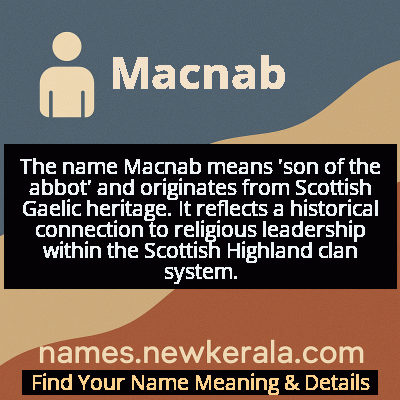Macnab Name Meaning & Details
Origin, Popularity, Numerology Analysis & Name Meaning of Macnab
Discover the origin, meaning, and cultural significance of the name MACNAB. Delve into its historical roots and explore the lasting impact it has had on communities and traditions.
Name
Macnab
Gender
Male
Origin
Scottish
Lucky Number
7
Meaning of the Name - Macnab
The name Macnab means 'son of the abbot' and originates from Scottish Gaelic heritage. It reflects a historical connection to religious leadership within the Scottish Highland clan system.
Macnab - Complete Numerology Analysis
Your Numerology Number
Based on Pythagorean Numerology System
Ruling Planet
Neptune (Ketu)
Positive Nature
Intuitive, analytical, spiritual, and inquisitive.
Negative Traits
Secretive, reserved, aloof, and can be overly critical.
Lucky Colours
Green, yellow.
Lucky Days
Monday.
Lucky Stones
Cat’s eye, moonstone.
Harmony Numbers
1, 5, 6.
Best Suited Professions
Scientists, researchers, spiritual leaders, detectives.
What People Like About You
Depth of knowledge, analytical skills, spirituality.
Famous People Named Macnab
Gilbert Macnab
Clan Chief
First recorded chief of Clan Macnab, established the clan's presence in the Scottish Highlands
Francis Macnab
Religious Leader
Notable Scottish minister and theological writer, served as Moderator of the General Assembly of the Church of Scotland
James Macnab
Botanist
Scottish botanist and plant collector, namesake of the plant genus Macnabia
John Macnab
Military Leader
Jacobite supporter and military figure during the 1745 uprising
Name Variations & International Equivalents
Click on blue names to explore their detailed meanings. Gray names with will be available soon.
Cultural & Historical Significance
The Macnab clan developed a distinctive cultural identity characterized by their tartan, crest featuring the head of a savage, and motto 'Timor Omnis Abesto' (Let fear be far from all). Their historical seat was at Kinnell House near Killin, and the clan maintained a fierce reputation for independence and resilience throughout Scotland's turbulent history. The cultural legacy of the Macnabs extends beyond Scotland through diaspora communities, particularly in Canada where many Macnabs settled after the Highland Clearances. Today, the name remains a powerful symbol of Scottish heritage, with active clan societies preserving traditions, genealogical records, and cultural practices that have been maintained for centuries.
Extended Personality Analysis
Individuals bearing the Macnab name are traditionally associated with strong leadership qualities, independence, and a deep sense of heritage. These traits stem from the clan's historical role as leaders and their reputation for fierce independence in the Scottish Highlands. Macnabs are often characterized by their determination, loyalty to family and community, and a practical approach to problem-solving that reflects their ancestral connection to religious administration and land management.
The name suggests someone with natural authority, spiritual depth, and the ability to mediate conflicts, mirroring the historical role of abbots in medieval Scottish society. There's also an element of resilience and adaptability, as the clan survived numerous political upheavals and maintained their identity through centuries of change. Modern bearers of the name often exhibit a blend of traditional values with contemporary thinking, maintaining strong family connections while embracing progress. They tend to be proud of their heritage but not bound by it, using their historical legacy as a foundation for modern achievement rather than as a limitation.
Modern Usage & Popularity
In contemporary times, the Macnab surname continues to be used primarily as a family name rather than a given name, maintaining strong connections to Scottish heritage worldwide. The name is particularly prevalent in Scotland, Canada, the United States, Australia, and New Zealand, reflecting patterns of Scottish emigration. While not among the most common Scottish surnames, it maintains steady usage and is often preserved by families proud of their Highland ancestry. Modern Macnabs have established clan societies that organize gatherings, maintain genealogical records, and promote Scottish cultural activities. The name has seen some revival in interest due to growing popularity of genealogical research and Scottish heritage tourism. In recent decades, there's been increased use of Macnab as a first name in some Scottish families, though this remains relatively uncommon compared to its traditional use as a surname.
Symbolic & Spiritual Meanings
The Macnab name symbolizes spiritual leadership, familial continuity, and Highland resilience. As 'son of the abbot,' it carries connotations of religious authority, wisdom, and moral guidance, reflecting the historical role of abbots as community leaders and spiritual advisors. The name also represents the enduring strength of Scottish clan traditions and the ability to maintain cultural identity through centuries of change. Symbolically, Macnab embodies the bridge between spiritual and temporal authority, suggesting someone who can navigate both practical and philosophical realms. The clan's history of survival through political turmoil adds layers of meaning related to perseverance, adaptation, and the preservation of heritage. The name evokes images of Highland landscapes, ancient stone buildings, and the continuity of family traditions passed through generations, making it a powerful symbol of Scottish cultural endurance.

